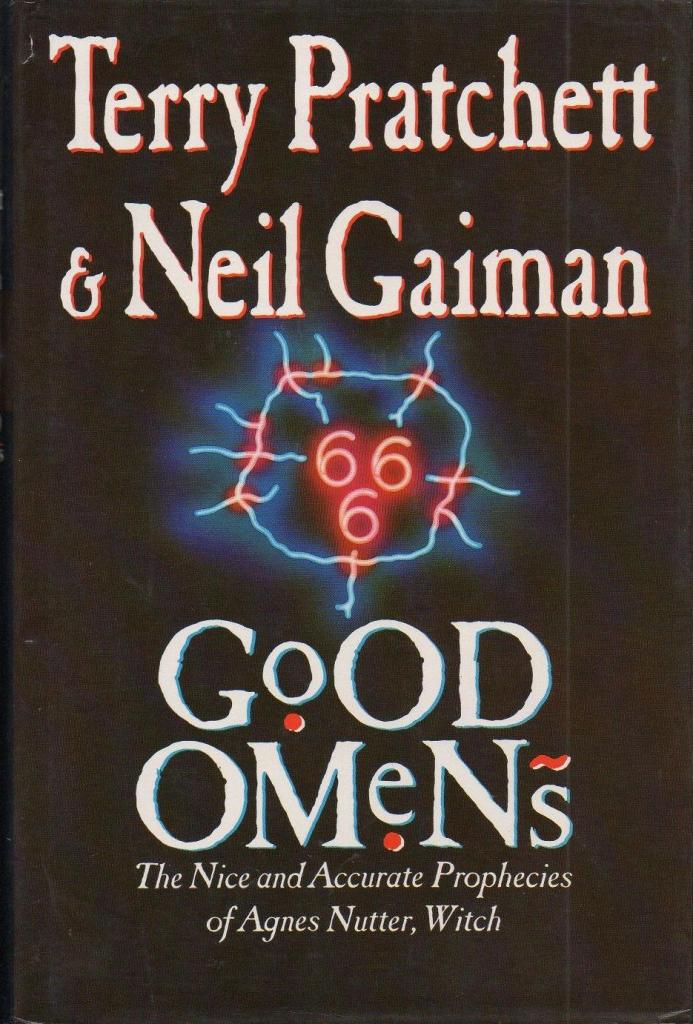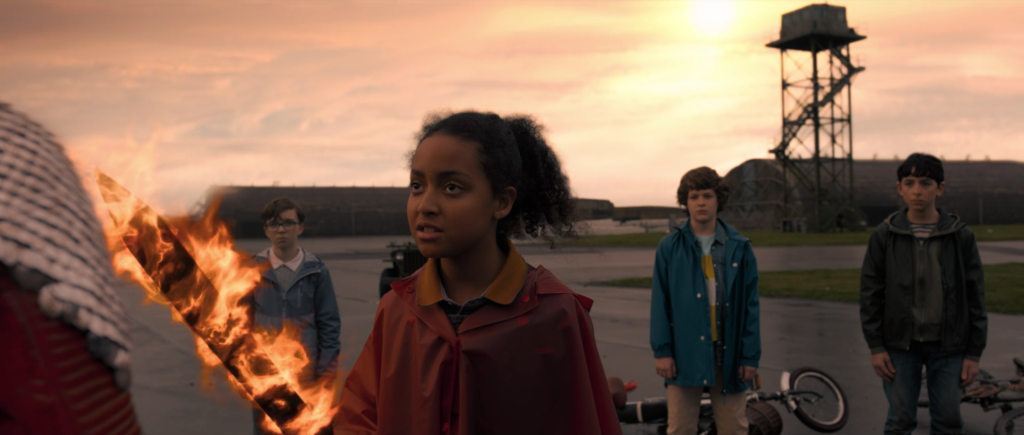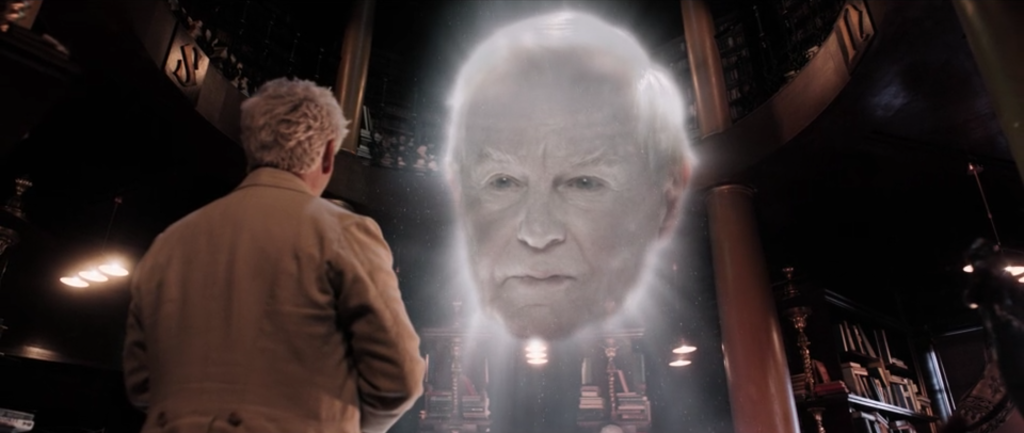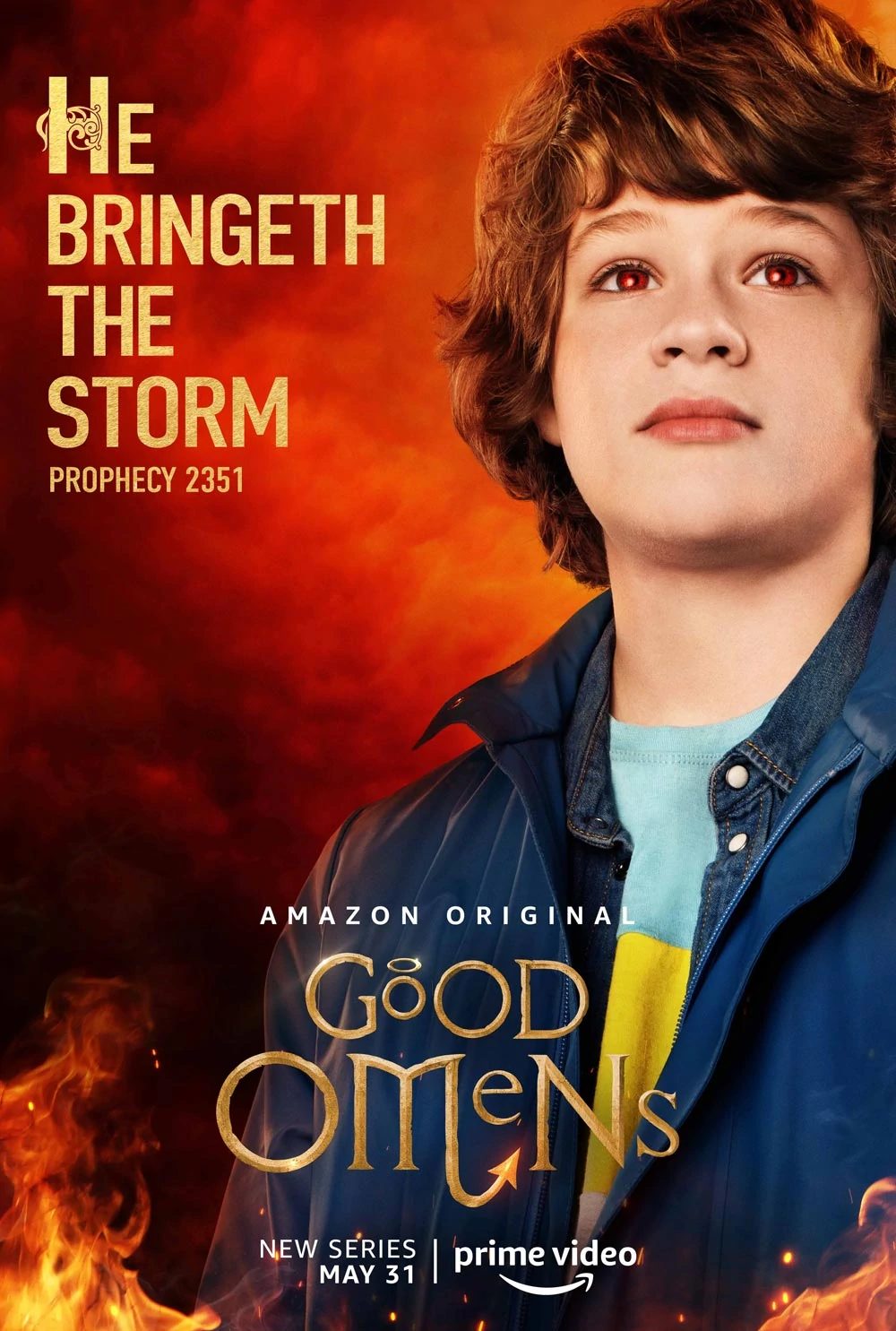Since its release, Good Omens has joined the ranks of many other films and tv shows that have dared to question some of faith’s most sacred ideas. I myself am a Christian, and my faith is something very near and dear to me. So what does this person of faith think of this outrageous, ludicrous piece of media that supposedly makes a mockery of some of Christianity’s most central figures and ideas?
I absolutely loved it.

First Edition cover for Good Omens.
For those who haven’t read the book by Pratchett and Gaiman, Good Omens tells the story of an angel named Aziraphale and a demon named Crowley who are on earth shortly before the AntiChrist is to bring about the Apocalypse. There’s just one small problem. It seems the AntiChrist has been misplaced. When both Aziraphale and Crowley get cold feet, they set out to find the AntiChrist and defeat him before he can fulfill his destiny. As they try to locate him, the boy, Adam, is going through inner conflicts of his own.

Crowley and Aziraphale watching Adam and Eve leave the Garden of Eden.
On its surface, Good Omens is simply a parody of various genre films dealing with the Biblical Armageddon, most notably The Omen. But it’s also an ingenious religious satire, joining the proud tradition of works like Life of Brian and Dogma. Good Omens won’t appeal to that certain denomination of Christians known as The Church of the Wet Blanket. For those with a more curious, open minded attitude about faith, Good Omens is a show with both unexpected delights and a strong moral compass.
Now a fair warning. I did consult the Nice and Accurate Prophecies of Agnes Nutter, Witch while writing this, so there will be some spoilers ahead.

Buy tickets for ‘Spider-Man: Far From Home’ here! Save $5 on your first purchase by using the coupon code Movies at checkout.
The Power of Humanity

Crowley and Aziraphale are confronted by whom Crowley calls ‘dimwitted Nazis.’
One of the most clever touches is in how Aziraphale and Crowley interact with the story, in that they’re ultimately of little consequence. The ineptitude of the main characters is best reflected during a rich montage in the 3rd episode, which chronicles some six thousand years of Aziraphale attempting to lead humanity down the righteous path and Crowley attempting to corrupt them. We see them in ancient Rome, the days of King Arthur, Nazi occupied Europe, but through it all the pair fail to make any real differences. Each keeps canceling out the efforts of the other. While in Paris during the 1700s, after being asked if he’s responsible for the latest atrocity, Crowley gets defensive.
The humans thought it up themselves. It’s got nothing to do with me.
Crowley
In most narratives, the main characters being ineffective would be a problem, but here, it’s one of the story’s more intelligent touches. They’re an angel and a demon. They cannot directly manipulate what happens, and any of their attempts to do so are bumbling failures. Even their initial plan to stop Armageddon by killing the AntiChrist is shown to be the wrong way handling things. Instead, they have a far more important role. They need to offer wisdom and guidance to the human players. The humans as it turns out, are the ones with all the power.

Witch-Hunter Newton Pulsifer and occultist Anathema Device partner up.
Humans are overall shown to be more open minded and powerful than both angels and demons. A good example of this are the witch Anathema Device and the plucky witch-hunter Newton Pulsifer. Though Pulsifer’s ancestor burned Anathema’s ancestor at the stake, the pair don’t stoop to continuing this generational conflict. In contrast to the eagerness of the angels and demons to fight, the pair instead make peace, among other things. Their partnership proves crucial in the climactic set piece of the show. Not only do Anathema and Newton show the power to alter the Earth’s fate, but they show a greater strength of character than their celestial counterparts.

Adam’s friends confront the Four Horsemen of the Apocalypse.
But Anathema and Newton are just one such example. A more spectacular example comes in the form of Adam the AntiChrist’s gang of young friends, Pepper, Brian and Wensleydale, known simply as ‘Them’ by locals. It is ‘Them’ who hold the power to defeat the Horsemen of the Apocalypse, namely War, Famine and Pollution (the latter of whom took over after Pestilence was defeated by penicillin.) In one of the show’s most satisfying scenes, Pepper, Brian and Wensleydale each confront the Horsemen with the changes they’d like to see in the world, thereby draining them of their powers. The human characters in Good Omens do get helpful tips from the celestial characters, but ultimately they make their own miracles. It’s a gift we often forget we have.
Religion vs. Faith
It would be a mistake to say Aziraphale and Crowley aren’t important to the story, as the struggles they go through reflect one of the show’s most interesting themes. One of the most touchy subjects in any faith is traditions. Sometimes we don’t want to part with them and view them as an essential part of our faith and ourselves. However, it’s easy to forget that many religious figures, Jesus included, were revolutionaries working against the status quo. Good Omens shows the differences between blindly following traditions, and allowing one’s faith to take you to new places.

The angel Gabriel and the demon Beelzebub share the same fundamentalist attitudes.
Good Omens portrays both angels and demons as rigid idiots with a fanatical devotion to their texts. Both parties are such zealots that they would rather see the world burn than stray from the Great Plan, the final battle between good and evil. So extreme is their devotion that when their plans for Armageddon start coming apart, angels and demons start working together to ensure it happens. They claim to represent opposing forces, but their blind devotion to texts has made them kindred. Both of them show the same stubborn refusal to ask any questions, in spite of faith often beginning with that most curious question of all. What does it all mean?

Aziraphale is blocked by Metatron while attempting to speak with God.
These and other questions are continuously deflected and silenced by those claiming to speak for God. Everyone making that claim in Good Omens is full of it. The angels claim to be working against the forces of darkness for the glory of the Almighty, yet they’re willing to work with Satan to destroy God’s creation. Aziraphale even tries to speak with God at one point, only to be blocked by Metatron who claims, without evidence, to be the avatar for God. Both angels and demons operate like a bad church more intent on keeping its parishioners in line than enlightened.

Aziraphale and Crowley questioning their traditions is what motivates them to save the world.
Aziraphale and Crowley are rebellious types. Both of them speak of ‘God’s Ineffable Plan,’ which according to them is unknowable. Since it’s unknowable, the pair are willing to take chances and try new things. This is the antithesis of almost every other angel and demon on the show. The other angels and demons assume they understand God, so they don’t bother trying to seek Her. Aziraphale and Crowley are the first to admit they know little about their maker. This motivates them to partake in a wild adventure, giving them a greater understanding of creation, God, and themselves. In a world of mad zealots, these two have the purest faith of all.
Prophecy vs. Free Will

A promotional image of Adam Young, the AntiChrist of Good Omens.
The conflict between prophecy and free will is best displayed with the show’s most significant character, the AntiChrist named Adam Young. Adam is prophesied to bring about the end of all things, so the forces of both Heaven and Hell are intent on keeping an eye on him in preparation for the final battle. However, in one of the show’s most humorous twists, the forces of darkness actually misplace Adam, focusing their efforts on the wrong child for eleven years. Free of their influence, Adam lives a normal, happy childhood with loving parents, a wide circle of friends, and a destiny he’s blissfully unaware of.

Adam meets Aziraphale and Crowley.
This unique portrayal of the AntiChrist is perhaps my favorite thing about Good Omens, as it does bring up some interesting points about the AntiChrist narrative. While I am a Christian, I never believed in the AntiChrist as a literal person. The very idea contradicts many of the rules set forth in the Bible, namely that Satan cannot create. He can only corrupt. Knowing this, Adam’s soul could only come from God, and any soul from God has free will. Therefore, doesn’t Adam have a choice whether or not he’ll fulfill the destiny set out for him? Good Omens asks these same questions, and uses them as the foundation for a fascinating character.

Adam discovers his powers.
Since Adam has free will, the only way to get him to fulfill the prophecy is by force and manipulation. Though Adam does initially want to use his powers to get rid of what he deems bad in the world, his fear of losing his friends and family eventually lead him to question his supposed purpose. With an unwilling AntiChrist, both the angel Gabriel and the demon Beelzebub attempt to bargain with Adam to ‘restart Armageddon’ as they put it. But Adam’s free will proves more powerful than any written prophecy. Aziraphale says it best during his and Crowley’s meeting with the reluctant Adam.
I was scared that you’d be hell incarnate. I hoped you’d be Heaven incarnate. But you’re not either of those things. You’re much better. You’re human incarnate.
Aziraphale

Satan confronts his son, but he’s in for a surprise.
Neither angel nor devil, Adam is free to enjoy all the privileges of being human, not the least of which is freedom to forge his own destiny. This power is on full display when Adam finally confronts Satan himself in one of the show’s most rewarding moments. It’s a profound tribute to the power and responsibility that comes with free will, and the hidden potential of every child. Born of hate, Adam still had the freedom to choose love. It’s a shame that so many missed the point. To me, this moment, and indeed much of this show, represent everything that Christ stood for. That it’s also very funny only makes it that much better.
In Closing

Aziraphale and Crowley share a moment.
Far from a piece of anti-Christian propaganda, Good Omens is a delightful miniseries that embraces a lot of Christ’s teachings in the form of witty satire. It can be enjoyed regardless of faith, but I think its ideas hold greater potency for those of us who do believe. There are those who treat faith like a cage, following a strict doctrine that robs them of some of life’s grandest adventures. Good Omens treats faith like an open door.
Walk through it and explore.
Like this article? Be sure to check out these other similar pieces by some of our top contributors!
The Marcus Nelson Murders & When They See Us; Two Perspectives on a Broken System

Reblogged this on hi and commented:
A really good post on Good Omens from a Christian perspective, something I was pretty curious about.
LikeLiked by 1 person